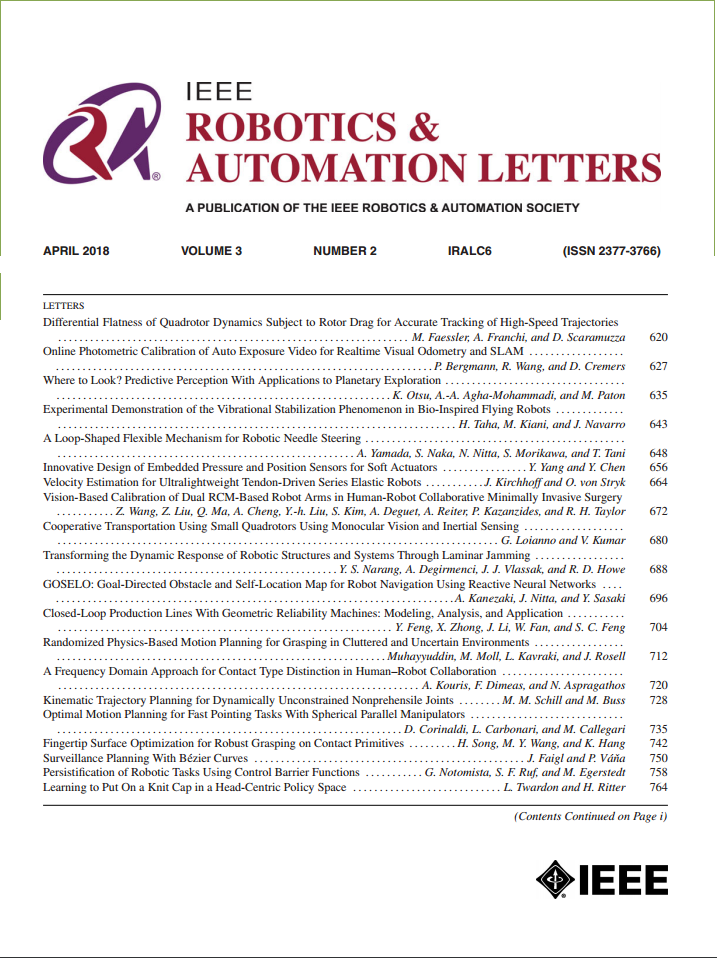通过 EKF 和 MHE 实现支腿机器人运动的快速分散状态估计
IF 4.6
2区 计算机科学
Q2 ROBOTICS
引用次数: 0
摘要
在这封信中,我们提出了一种用于控制腿部运动的快速分散状态估计框架。通过扩展卡尔曼滤波器(EKF)和移动地平线估计(MHE)分别对浮动基座状态的非线性估计和线性速度估计进行分散处理。EKF 结合惯性传感器和视觉来估计浮动基座的方向。MHE 利用所有传感器在过去一个时间窗口内估算的方位,根据带状态约束的相关状态的时变线性动力学公式估算线性速度。更重要的是,我们提出了一种基于全信息滤波器(FIF)优化结构的边际化方法,将平等约束的 FIF 转换为等效的 MHE。这种状态估计的解耦促进了计算效率、估计精度和包含状态约束之间的理想平衡。研究表明,所提出的方法能够为多个腿部机器人提供精确的状态估计,包括高动态跳跃机器人 PogoX、双足机器人 Cassie 和四足机器人 Unitree Go1,频率为 200 Hz,窗口间隔为 0.1 秒。本文章由计算机程序翻译,如有差异,请以英文原文为准。
Fast Decentralized State Estimation for Legged Robot Locomotion via EKF and MHE
In this letter, we present a fast and decentralized state estimation framework for the control of legged locomotion. The nonlinear estimation of the floating base states is decentralized to
an orientation estimation via Extended Kalman Filter (EKF)
and
a linear velocity estimation via Moving Horizon Estimation (MHE)
. The EKF fuses the inertia sensor with vision to estimate the floating base orientation. The MHE uses the estimated orientation with all the sensors within a time window in the past to estimate the linear velocities based on a time-varying linear dynamics formulation of the interested states with state constraints. More importantly, a marginalization method based on the optimization structure of the full information filter (FIF) is proposed to convert the equality-constrained FIF to an equivalent MHE. This decoupling of state estimation promotes the desired balance of computation efficiency, accuracy of estimation, and the inclusion of state constraints. The proposed method is shown to be capable of providing accurate state estimation to several legged robots, including the highly dynamic hopping robot PogoX, the bipedal robot Cassie, and the quadrupedal robot Unitree Go1, with a frequency at 200 Hz and a window interval of 0.1 s.
求助全文
通过发布文献求助,成功后即可免费获取论文全文。
去求助
来源期刊

IEEE Robotics and Automation Letters
Computer Science-Computer Science Applications
CiteScore
9.60
自引率
15.40%
发文量
1428
期刊介绍:
The scope of this journal is to publish peer-reviewed articles that provide a timely and concise account of innovative research ideas and application results, reporting significant theoretical findings and application case studies in areas of robotics and automation.
 求助内容:
求助内容: 应助结果提醒方式:
应助结果提醒方式:


